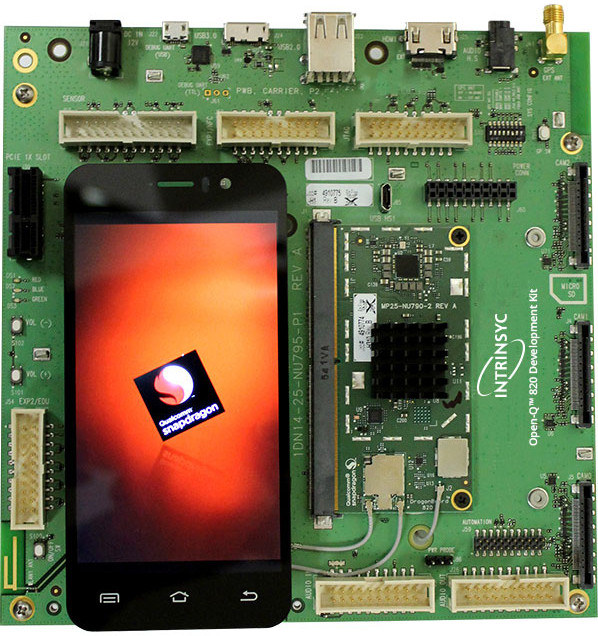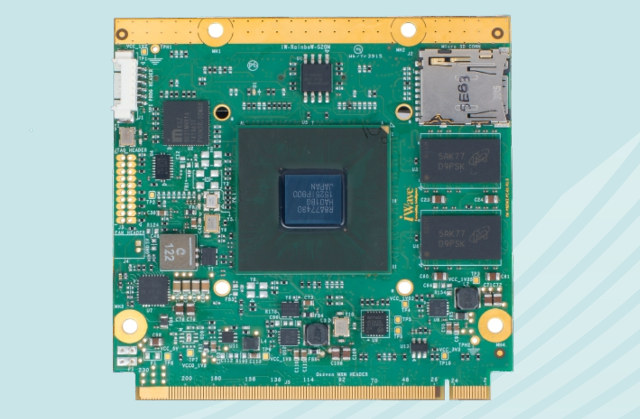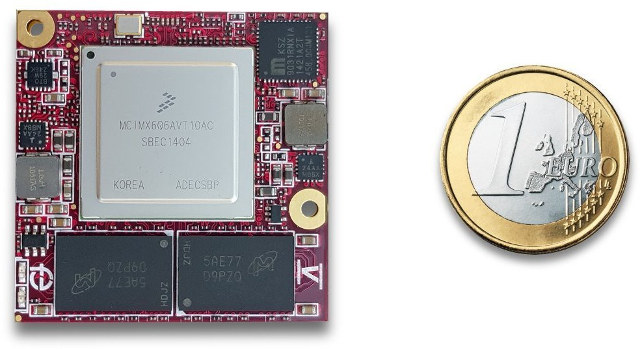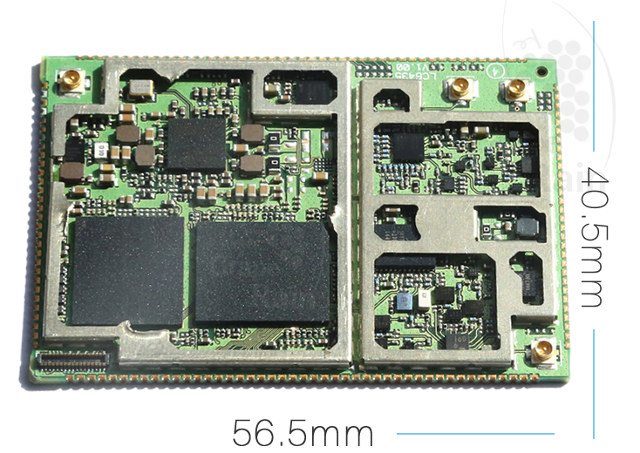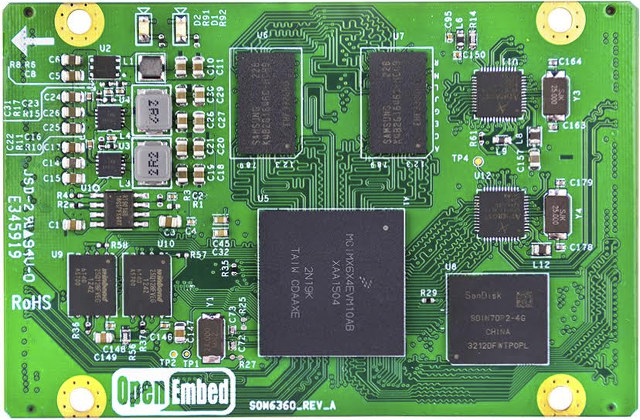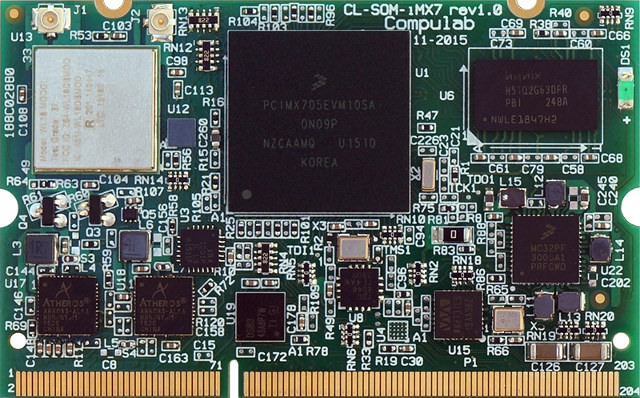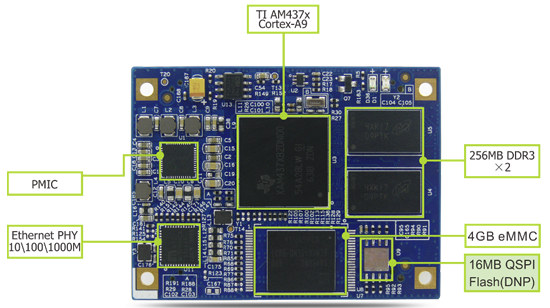GeekBox is both an Android TV box based on Rockchip RK3368 octa-core processor, and a Linux development kit thanks to the CPU module inside the device, a baseboard and various accessories. The company has sent me a review sample, as well as the accessories currently available. So today, I’ll have a look at the box, and show how to connect everything together. GeekBox TV Box Unboxing I’ve received two carton boxes via DHL, one with GeekBox itself, and the other with some accessories. You could use GeeBox has a TV box, and forget about its development attributes, as the device comes with the usual accessories include a case, an HDMI cable, an infrared remote control, and a 5V/2A power supply. I was really surprised by how small it was compared to other 64-bit ARM TV boxes recently launched on the market, and looks very much like a small router with […]
Intrinsyc Introduces Qualcomm Snapdragon 820 Cortex-A72-Class Development Board, SoM and MDPs
While there’s already an healthy choice of ARMv8 development board such as LeMaker Hikey, or Qualcomm DragonBoard 410c, all those platforms are based on the lower end Cortex A53 64-bit ARM core, and ARM Cortex A57, let alone Cortex A72, boards are much more difficult to find, as they are much pricier and/or have limited availability. Intrinsyc may have released the first (somewhat) affordable and accessible Cortex-A72-class development board with Open-Q 820 development kit comprised of a SoM and a baseboard, as well as smartphone and tablet mobile development platforms (MDPs) based on Qualcomm Snapdragon 820 quad core Kryo processor. While Kryo is a custom ARMv8 designed by Qualcomm, and not exactly a Cortex A72 core, both have similar performance, as shown in Snapdragon 820 Antutu and Kirin 950 Antutu results. Open-Q 820 board specifications: SoC – Qualcomm Snapdragon 820 quad core Kryo cores with 2x cores @ up to […]
iWave Systems iW-RainboW-G20M-Q7 SoM Features Renesas RZ/G1M Cortex A15 SoC
iWave Systems has unveiled a new Qseven 2.0 compliant system-on-module part of their RainboW family with iW-RainboW-G20M-Q7 module powered by Renesas RZ/G1M dual core ARM Cortex A15 SoC, and targeting industrial and automotive applications with over 10 years of support. iW-RainboW-G20M-Q7 module specifications: SoC – Renesas RZ/G1M dual core ARM Cortex A15 @ 1.5GHz with PowerVR SGX544MP2 GPU @ 520MHz System Memory – 1GB DDR3(expandable) Storage – 4GB eMMC Flash (expandable) + 2MB SPI NOR Flash for boot code, and optional Micro SD Slot Connectivity – 1x Gigabit Ethernet PHY USB – 2 Port USB HUB I/Os via 230-pin Qseven edge connector: Storage – 1x SATA , 1x SDHC USB – 1x USB3.0 host, 2x USB 2.0 hosts, or 1x USB 2.0 device Display – 1x LVDS Connectivity – 1x Gigabit Ethernet Audio – 1x I2S Audio 2x PWM, 2x I2C, SPI, CAN, UART, GPIOs 1x PCIe (multiplexed with SATA) JTAG or […]
iMX6 TinyRex Module and Development Board Support HDMI Input in Linux (Video Demo)
A couple of years ago, I wrote about iMX6 Rex open source hardware project combining a Freescale i.MX6 SoM and baseboard that aimed a teaching hardware design (schematics and PCB layout). I had not followed the project very closely since then, until I watched a video showcasing HDMI input capabilities in Linux using the new version of the module and baseboard called i.MX6 TinyRex. i.MX6 Tiny Rex module specifications: SoC – Freescale iMX6 processor up to 1.2GHz and 4 cores System Memory – Up to 4GB DDR3-1066 (533MHz) Storage – EEPROM Connectivity – 10/100/1000 Mbps Ethernet PHY I/Os via 3 board to board connectors: Display / Video Output 1x HDMI (up to QXGA 2048×1536) 1x LVDS (up to WUXGA 1920×1200) 1x 20-bit parallel LCD display (up to WXGA 1366×768) or 1x Video Input (CSI) 1x MIPI DSI differential display output (up to XVGA 1024×768) Video Input 1x 20-bit parallel video input […]
Graperain Introduces G8916 Qualcomm Snapdragon 410 SoM and LTE Mobile Development Board
Qualcomm applications processors used to be found mostly in consumer devices like smartphones and tablets, but recently the company has expended their use to the embedded space, and for example, we’ve seen Snapdragon 410 64-bit ARM processor used in DragonBoard 410c board, Intrinsyc Open-Q 410 SoM, Inforce 6309 SBC, and today I’m going to have a look at Graperain G8916 system-on-module that’s also integrated into a 4G/LTE mobile development platform. G6916 CPU module specifications: SoC – Qualcomm Snapdragon 410 (MSM8916) quad core Cortex A53 processor @up to 1.4GHz with Adreno 306 GPU System Memory – 1GB DDR3 (2GB optional) Storage – 8GB eMMC 4.5 flash (16 and 32GB optional) + micro SD support up to 128GB via I/Os Connectivity – 802.11 b/g/n WiFi, Bluetooth 4.0 LE, FM, NFC/RFID, GPS/GLONASS with 4x on-module antenna connectors. Cellular Connectivity TD-LTE – B38/B39/B40/B41; FDD-LTE – B1/B2/B5/B/B26 TD-SCDMA -B34/B39 GSM – 850/900/1800/1900 CDMA – 1x/EVDO […]
OpenEmbed SOM6360 is a $69 Freescale i.MX6 SoloX System-on-Module
Apart from UDOO Neo development board, which is currently shipping Kickstarter backers, I hadn’t seen many Freescale i.MX 6SoloX based hardware so far. But Shenzhen OpenEmbed has now launched a system-on-module powered by Freescale Cortex A9 and Cortex-M4 SoC with their SOM6360 CPU module. OpenEmbed SOM6360 Rev. A computer-on-module specifications: SoC – Freescale i.MX 6SoloX ARM Cortex-A9 core @ 1GHz with ARM Cortex-M4 Core @ 200 MHz, and 2D and 3D multimedia accelerators System Memory – 512MB DDR3L (1GB optional) Storage – 4GB to 32GB eMMC flash, 32MB QSPI flash Video Input/Output 18-bit digital RGB 24-bit LVDS (up to WXGA) Analog/digital camera interface (YUV4:2:2 CCIR-656) Connectivity – 2x Gigabit Ethernet interfaces (2x on-board AR8033 PHYs) Other I/Os via 2x 120-pin connectors: 1x USB 2.0 host, 1x USB 2.0 device 5x serial,2x CAN 2.0 2x I2C, 2x SPI 2x SDIO PWM Optional 12-bit ADC PCIe 2.0 Misc – Watchdog Power Supply – […]
Compulab Unveils CL-SOM-iMX7 Freescale i.MX7 System-on-Module and SBC-iMX7 Single Board Computer
After a few years of speculations and developments about i.MX7 and i.MX8 processors, Freescale announced Freescale i.MX7 family this summer. The new processors are based on one or two Cortex A7 cores coupled with a Cortex-M4 MCU for real-time tasks, and are a low power alternative to Freescale i.MX6 processors. But so far I had only seen a few announcements such Toradex i.MX7 SoM or Freescale 96Boards, without any product actually shipping, and Compulab claims to the first to market with a Freescale i.MX7 system-on-module, namely their CL-SOM-iMX7 SoM which will ship in quantities in early January 2016. CL-SOM-iMX7 system-on-module specifications: SoC Freescale i.MX 7Solo single core Cortex-A7 @ 800MHz with NEON SIMD and VFPv4 + ARM Cortex-M4 @ 200Mhz Freescale i.MX 7Dual dual core Cortex-A7 @ 1GHz with NEON SIMD and VFPv4 + ARM Cortex-M4 @ 200Mhz System Memory – 256MB to 2GB DDR3L-1066 Storage – 128MB – 1GB […]
MYIR Tech Introduces TI Sitara Cortex A9 MYC-C437X SoM and MYD-C437X Development Board
MYIR Tech previously launched Ricoboard, a low cost single board computer powered by Texas Instruments AM4379 ARM Cortex A9 processor. The company has now introduced a system-on-module based on Sitara AM437x processors, as well as a corresponding carrier board for industrial applications. MYIR Tech MYC-C437x Sitara AM437x System-on-Module MYC-C437x SoM specifications: SoC – Texas Instruments AM437x single core ARM Cortex A9 processor @ up to 1GHz (AM4376, AM4377, AM4378, AM4379) with PowerVR SGX530 GPU (for AM4378/AM4379) System Memory – 512MB DDR3 (256MB optional) Storage – 4GB eMMC Flash (reserved 256/512MB Nand Flash design), 16MB QSPI Flash (unpopulated by default), 32KB EEPROM Connectivity – Gigabit Ethernet PHY Peripherals and signals via 2x 100-pin board to board connectors (0.8mm pitch): 2x Gigabit Ethernet 2x USB 6x Serial ports, 2 x CAN 2x I2C, 2 x SPI 14x ADC (8 channels from ADC1 and 6 channels from ADC0) 3x SDIO 2x Camera interfaces JTAG […]



